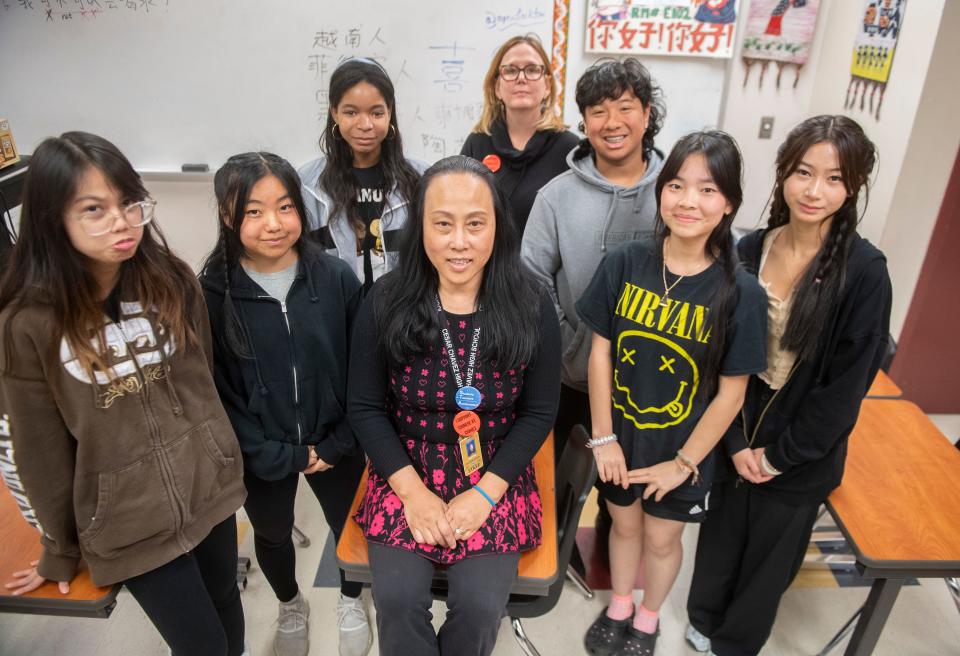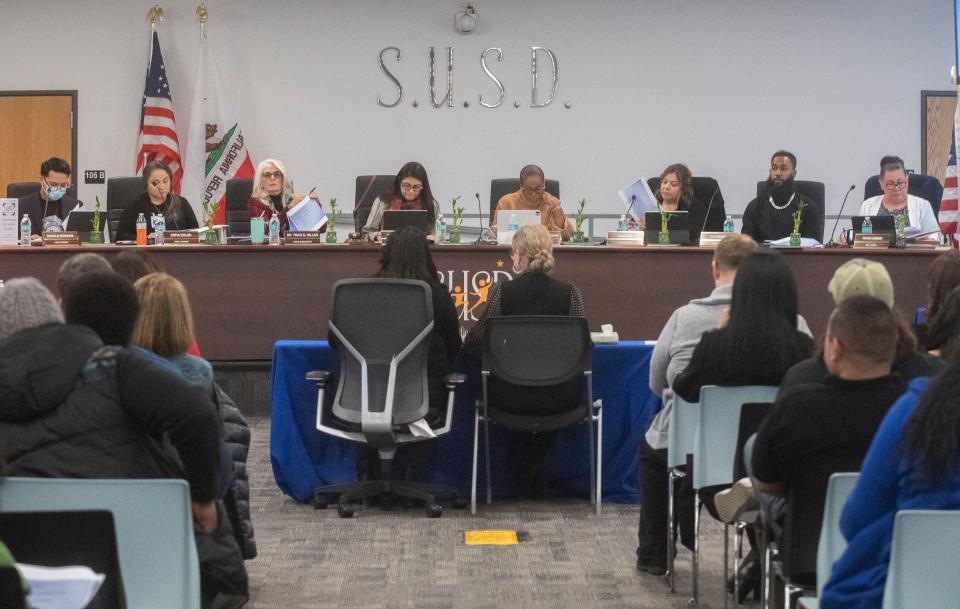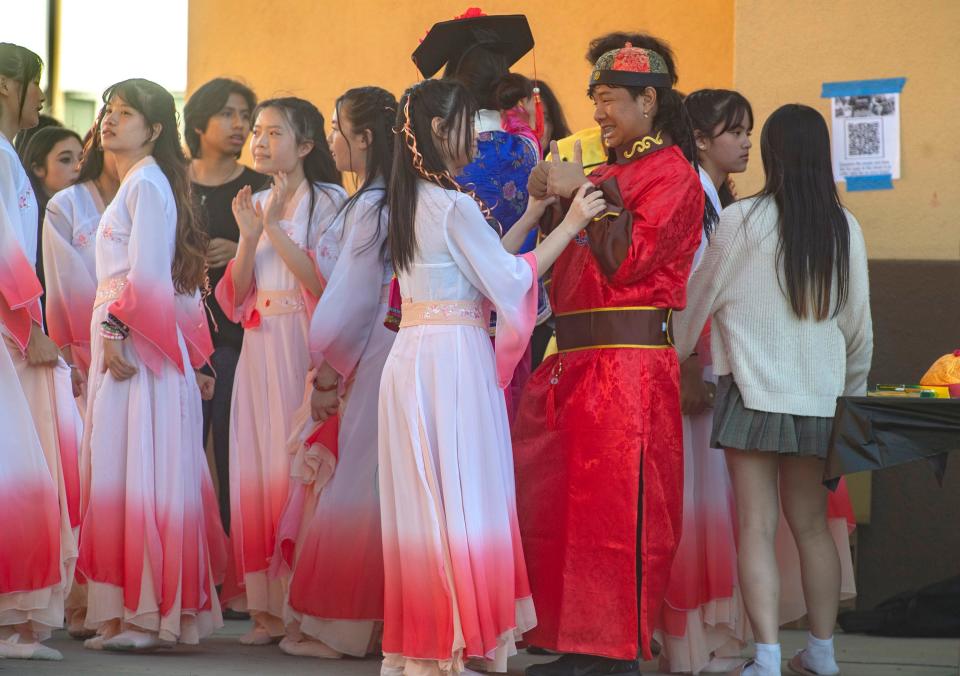How a small group of students saved the Chinese program at Chavez High School
Skyler Hong is a Cambodian freshman at Cesar Chavez High School, where over a quarter of the school’s roughly 2,300 students are Asian.
Hong said his upbringing in Stockton has been different than some of his friends who come directly from Cambodia; when his grandparents immigrated to the United States, they wanted their children to focus on learning English and assimilate into American culture.
“My parents want me to know a lot of stuff about America and English,” Hong said.
Hmong and Khmer — the native language of Cambodia — are the third and fourth most-spoken languages within Stockton Unified School District behind English and Spanish. Twenty-eight percent of Stockton Unified’s roughly 8,600 English learners are not graduating high school, Director of Language Development Israel Gonzalez said.
The only curriculum offering a window into Asian language and culture at Chavez is Mandarin Chinese, the second-most popular language on Earth.
Eager to connect with his family’s culture, Hong enrolled in Chinese II and is one of 67 students in the three Chinese language classes that make up the program at Chavez.
“Chinese is finally something I can try to learn more about … it’s helping me connect to my own culture,” Hong said.
“(Chinese) provides the same comfort as different Asian cultures,” another student in the program said.

Qing Wang teaches the Chinese classes at Chavez. Her students call her Wang Laoshi — her last name, followed by “teacher” in Chinese. She’s made the Chinese program at Chavez into a home away from home for students from all walks of Asian culture.
“In China, there are Hmong people, too. Historically, some Cambodian’s were from China … lots of Hmong people, Vietnamese, Thai people, Laotians, they were from China,” Wang said. “Chinese language, in some ways, the tones and some grammar are related to other Asian languages.”
'Hopeless' but not beaten
In January, Wang said she was informed that she would not teach any Chinese classes next year.
“To me, that is the cancellation completely, or elimination,” Wang said. “I was shocked.”
Wang's students felt blindsided, but they didn’t stay down for long.
Jazelle Coleman, a Chavez student and first-year student-reporter, heard the school's Chinese classes were to be cancelled. She decided to pursue the story for her first writing assignment with The Oracle, Chavez’s student news outlet.
“I tried to schedule an interview with the principals, but they refused to meet with me,” Coleman said. “They were saying it was only a conversation even though (the students) were already fighting to keep the classes.”
Coleman and The Oracle ran the story without comment from Chavez administrators.
“A lot of people liked the story,” Coleman said. “A lot of teachers were in support of the Chinese classes … (The story) brought a lot of traction to the situation. It’s what got other staff to hear us out.”
Coleman’s story earned some of Wang’s students an unproductive trip to the principal’s office — Chinese I and III were proposed to be cut. Hong and his friends continued to organize and advocate for the Chinese program.
More: Stockton Unified, where 45 languages are spoken at home, aims to aid Hmong, Cambodian families
“We wanted to let everyone know what was going on around school. We really wanted to let everyone in the community help us also,” Hong said. “One of my ideas was the online petition … also after that we made teacher signatures … we handed out flyers with QR codes to the petition … and posted a lot of stuff on social media.”
In February, with more than 1,000 signatures, Hong and his friends were back in Principal Cynthia Cardenas Sanchez’s office.
“There’s a part where students give their testimonials, and I was reading how a student felt about Chinese class when she said, ‘Hold on there. I feel like you guys are spreading rumors,” Hong said.
By March, Ms. Wang said her and the students “were hopeless.”
Personal passion drives fight
Coleman said her story in The Oracle attracted the attention of Chavez’s new Stockton Unified Trustee Sofia Colón, a Stockton Unified alum. She met with Wang and her students and related with their passion to connect with their family cultures.
“I thought, ‘If the kids are passionate, then I need to focus on that.’ … I’m not fluent in Spanish. My mother was, and she thought I’d learn Spanish in school,” Colón said. “To want to hold onto your language in some way, and to be passionate about it — I feel like I understand that feeling. It gave me a little bit more personal passion to help this class.”
Attendance, enrollment and staffing all go into decisions made about class offerings, Colón said. She had a discussion with Interim Superintendent Traci Miller and invited Wang and the group of students fighting to keep the Chinese program alive to the March 6 board meeting where Wang’s position was to be included in a round of layoffs.
The day before the board meeting, Wang and her students received a call from Sanchez.
“(She said) we were the first to find out that it had been decided to once again add Chinese I and Chinese III back to the registration forms,” Ellena Gibbons, an English teacher at Chavez who helped advocate for the Chinese program, said.
“She said she had asked the board for an extra FTE (full-time equivalent) so she could have Chinese back.”
More: Chavez principal says she was forced out of her job. Stockton Unified leaders won't say why
The layoffs were approved March 6, but not before removing the Chinese services position from the chopping block. The program had been saved. The students couldn't get through the locked door in the front of the Arthur Coleman Jr. Administrative Complex to speak that night, but in April they were back in full force.
Hong and his friends spoke in front of a packed board room April 4 of their fight to keep their place of comfort that connects them to their family cultures.

“When we finally got to talk to Ms. Colón it finally felt like we were going somewhere,” Hong said. “When we got to talk to the board, it felt like we actually were heard. There were a lot of people in that room. Everyone was able to hear.”
Uncertain future
While the Chinese program lives to see another year, Chinese I and II did not make it onto the list of classes for students to sign up for.
“When you would go to your counselor, on the paper, you wouldn’t see it, because it wasn’t up to date,” Hong said. “You would have to ask for (Chinese I or III).”
Ailily Kim, a Chavez student in the Chinese program, worries of the consequences from not everyone getting a fair chance to sign up for Chinese for next year.
“When we had a meeting with the principal, she brought up numbers,” Kim said. “My concern is, what if next year they bring it back and take that (enrollment number), which is not even right, and make this (happen) all over again?”

It brings Wang distress to see her students struggle with the uncertainty of something they’re so passionate about.
“I feel heartbreak. I’m still feeling that way,” Wang said. “They have been stressed out. They have been feeling disrespected. They have been still worrying about the future of the Chinese program.”
For now, the Chinese program lives on. Wang and her students celebrated Chinese culture with song and dance April 20 at Chavez’s first-ever Culture Fest.
This article originally appeared on The Record: How students saved the Chinese program at Chavez High School

